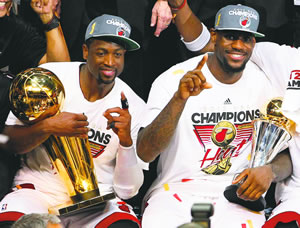Don’t Hate — Congratulate LeBron

The Miami Heat’s Dwyane Wade holds the Larry O’Brien NBA Championship Trophy, and LeBron James holds his most valuable player trophy after Game 5 of the NBA finals basketball series against the Oklahoma City Thunder June 22 in Miami. The Heat won 121-106 to become the 2012 NBA Champions. AP photo/Jim Sladky
Future historians are likely to determine that the story of LeBron James lacks the redemptive narrative of any good biblical tale or uninspired Hollywood ending. But the former bane of eastern Ohio should be at least remembered for successfully navigating the treacherous waters of athletic expectation.
Called a villain, an ego-maniac, a choke artist lacking the closer gene that seemingly inhabits all great athletes who do not participate in ill-advised self-promotional campaigns, James was the face of everything that is wrong with professional sports.
Yes, The Decision was ridiculous, but after taking full responsibility for last season’s failure and engineering a complete dominant victory over what many assumed was a younger and deeper team, it is time for the naysayers to simply shut up.
As former Knicks and Rockets coach Jeff Van Gunny correctly pointed out, the statute of limitation on dumb comments has passed, and it’s now time to admit the obvious: LeBron James is the best basketball player on the planet, and outside of those two days of infamy, is an athlete to be celebrated, not reviled.
LeBron James circa 2012 is the final product of the greatest talent in NBA history (something he was born with) and hard-earned maturation (which he later developed). Last year’s devastating Finals loss to the Mavericks gave birth to the modern LeBron.
Last year, James was many things his detractors suggested. He expected victory and deference. He took plays off and pouted. After joining good friends Dwyane Wade and Chris Bosh, James expected not four, not five, not six, not seven championships to follow.
That has yet to happen. Yet against some past behavior and current fan expectation, James took the loss personally, saying after last week’s clincher in Miami that he had to get better on the court and off. He did just that.
James dominated and gave a season-long effort many said he was incapable of, and a playoff performance that was among history’s best. Whereas in years past he settled for jumpers, James drove to the basket with reckless abandon. He rebounded better, passed better and became the physical, emotional and mature leader his team needed.
While the on-court change was easy to see, the improved off-court behavior is harder to quantify, simply because James was never the villain he was portrayed to be. Yes, James was difficult to deal
with at times during his tenure in Cleveland, but so were many of his more-popular, less-scrutinized predecessors. While not discounting his actions, those of us who have chronicled his rise, fall and rise again must admit to our own complicity in the creation and destruction of James’ legacy.
It was we, the media and fans, who put James on the cover of Sports Illustrated when he was just 16 and treated his free agent exercise as if he were running for national office. It was we, the adults who are supposed to help kids remain kids, who bought and sold LeBron James paraphernalia while he was still in high school. And it was we, the business of sports, who turned an athlete into a commodity by moving his amateur games from high school gyms to the University of Akron – and onto ESPN – to better cash in on the teen phenom.
If you’re a New York, Boston, Chicago or Cleveland fan who still hates James and the Miami Heat because they stand in the way of your own team’s success, then so be it. It’s sports. Disapproval of the opposition is natural, healthy and profitable for the league. But hate based on ignorance or inaccurate information is wasteful and just plain stupid.
PS: Congratulations to Heat coach Erik Spoelstra. Supposedly nothing more than a baggage handler for James and a space-filler until Pat Riley once again decided to return to coaching, Spoelstra kept the team together when it was down 2-0 to Indiana and 3-1 to Boston.
Effective coaching is as much about settling ego and carefully distributing limited minutes as it is about diagraming plays. Spoelstra did both extremely well.





